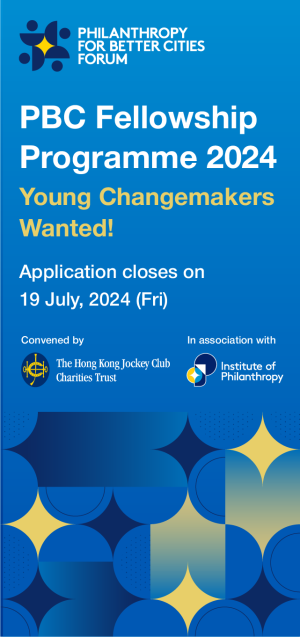Our economic system is failing humanity and infringing planetary boundaries’, according to Steph Brobbey, a former private wealth lawyer turned social justice advocate, and founder of the Good Ancestor Movement. She told participants at The Philanthropy Workshop global summit earlier this month what they could do to be part of the solution. Here’s an edited version of her speech.
If you have done your homework on the speakers, you will know that until 18 months ago, I worked as a private wealth lawyer in the City of London helping many of the wealthiest people in the world accumulate more wealth than they needed and finding ways for them to pay as little tax as possible. How my world has changed since then.
For the best part of a decade, I was serving a system which, put simply, profits from perpetuating extreme wealth concentration. It is a system which structurally denies the possibility of shared prosperity and abundance for every citizen in the world. I made my salt essentially through propagating a scarcity mindset, but I wasn’t always conscious of it.
For a while I was living a double life, navigating an ethical tightrope between my life in the City and the social causes and communities I supported. I served on the board of a grassroots youth charity based in a disenfranchised community, cut off from decent infrastructure and amenities. All the while a stone’s throw away, Battersea Power Station was developing luxury flats, which predominantly ended up in the hands of international investors – seeking a little safety deposit box in the sky as we used to say – and ultimately profiting from scarcity and speculation.
These colliding realities caused me to reflect on my relationship to the economy, setting aside what you might call my ‘ethical side hustles’ and really beginning to interrogate how my professional role was situated in the global economy. It became very clear to me that the impact of my day-to-day work far outweighed the ‘good’ I was doing. I came to realise how far out of alignment I was with my own values and my ideal vision of the world.
So how did I burst the bubble and escape my gilded cage? Well on NYE in 2019 a dear friend of mine told me two things which permanently shifted my reality. First, according to Dr Naseem Nicholas Taleb, the three most harmful addictions in life are heroin, carbohydrates and a monthly pay cheque.
Secondly, there are more foodbanks than McDonalds the UK.
In that moment, I realised I couldn’t allow myself to continue in the comfort and security of my job if it meant being complicit with an economic system that has allowed the world’s fifth most advanced economy to open more foodbanks than branches of the most popular fast-food chain in the world. I came to the conclusion that as an actor in the global economy, my professional function was perpetuating extreme wealth concentration.
At the Good Ancestor Movement we invite wealth holders to de-centre their relationship to philanthropy, and instead, reflect on their broader economic participation. The invitation for you today is to de-centre philanthropy and to situate the wealth represented by this community in its proper context, andreflect on what you are embodying in the global economy.
Consider for a moment the relationship between your wealth and the economy. What is your wealth and power doing in the world? Could you be taking more from the world than you are giving to it? Think about the future generations who will inherit the world we leave behind. Can you truly say that your practices around wealth stewardship in its broader sense are contributing to shared prosperity and abundance for all? In an economic system designed to extract and exploit and concentrate wealth among a few, it is hardly surprising if the answer is no.
Our economic systems and structures do not by design unlock shared prosperity and abundance for all. According to Oxfam’s latest report Survival of the Richest, the richest 1% have captured almost two-thirds of all new global wealth generated since 2020. The very wealthiest have become dramatically richer and corporate profits have hit record highs, while hundreds of millions of people around the world struggle to meet the cost of basic goods, driving extreme inequality and inflicting economic violence.
In March last year the independent research subsidiary of BNP Paribas found that Britain ranked the second most unsustainable of 36 major economies, and that the country was on the brink of civil unrest owing to the high costs of childcare and housing. Unfortunately, those of you who are living in the UK will know that that prediction was terrifyingly accurate as a sea of industrial action has swept across the nation over the past year.
So that’s the bad news – or some of it. The good news is that you, individually and as a community, can exercise your power, influence, and agency to disrupt the status quo by the way you personally participate in the economy and the manner in which you mobilise resources. The even better news is that you’ll be in good company, as the Good Ancestor Movement is fast becoming home to a vanguard of wealth holders seeking both to live in alignment with their values; and contribute to resourcing new economic systems anchored in ecological and social wellbeing and repair.
In that vein, I want to offer some strategies for unlocking shared prosperity and abundance through regenerative wealth stewardship. When helping clients to find alignment, we tend to help them interrogate their practices through five core disciplines:
- Scale of wealth;
- Investment practices;
- Tax practices;
- Business ownership;
- Repair.
In the interests of time I’m going to focus on the top three:
- Ask yourself “How much is enough”, do the work necessary to ascertain and implement this, then go and create accountability practices. In a world where the direction of travel seems to be to accumulate as much wealth as possible regardless of need, it is a powerful choice to create boundaries which clearly define excess wealth. Ideas of private sufficiency and public luxury, shared abundance and prosperity for all have become a guiding philosophy for our community.
- If you have more wealth than you reasonably need, audit your investments and really interrogate whether you need to be expecting financial returns alongside impact. Find different and innovative ways that enable you to use your capital as a tool that absorbs risk for those who cannot afford to take such risk. At the Good Ancestor Movement we’re developing a non-extractive investment advisory practice informed by the needs of grassroots organisations, often disenfranchised and excluded from access to mainstream finance and impact capital.
- Participate in fair taxation and advocate for more effective taxes on wealth so that those with the most bear their fair share of taxation as currently across global tax systems, wealth is undertaxed, and loopholes are still in existence. When facilitating a group recently I asked them what they thought tax justice was really about. One person immediately piped up and said “it’s about the kind of society we want to live in, isn’t it?” Talking about tax might not feel sexy. It is one of the issues that wealth holders in our community grapple with most, but the fact is tax is the lifeblood of the social contract between citizen and state. Paying fair taxation and acknowledging that our governments are flawed are not mutually exclusive. Tax is an investment in the commons. Philanthropy and benevolence can never replace a fair system of progressive taxation.
In an economic system that is failing humanity and infringing on planetary boundaries, how far are you willing to go to unlock abundance for all? Perhaps you might start by accepting the invitation to view fair taxation as an extension of good citizenship; or by beginning a journey of interrogating how much you really ‘need’ when so many people around the world are struggling to exercise their humanity. It would seem to me that shared abundance is the most natural outcome in the world when we focus on the practice of being in right relationship to each other as a global community and being in right relationship to our planet. I offer this as a guiding light as you mobilise your resources, walking, I hope, towards a common vision for global justice, not just for good.
Steph Brobbey is founder and CEO of the Good Ancestor Movement. For more, see The Good Ancestor Movement





Comments (0)